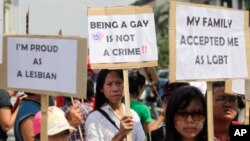Just a month after Indonesia’s Constitutional Court rejected a petition to ban gay and extramarital sex, the country’s parliament seems poised to pass a sweeping set of revisions to the nation’s criminal code that would criminalize extramarital and gay sex. Civil society and activists are extremely concerned. But at least one legislator has told reporters that all 25 members of a working committee have agreed to all the proposed revisions.
An online petition started this week calls on Parliament to remove the articles criminalizing zina (adultery) has received more than 26,000 signatures to date.
There are concerns that the bylaws will increase raids and vigilantism, overcrowd prisons, and further persecute Indonesia’s LGBT community.
Sundry restrictions
The two sections that have most alarmed activists are Article 484 and Article 496, which suggest five years in prison for extramarital sex and imprisonment for same-sex relations with a minor. Article 496 also criminalizes same-sex relations between adults if there is “violence or threat of violence, breaching public morality, publications containing pornography,” according to Andreas Harsono, a senior Indonesia researcher with Human Rights Watch who translated the proposed revisions. He says the latter is so broadly phrased that essentially all gay sex would become illegal.
The proposed revisions also include clauses that would penalize “unauthorized personnel” for sharing information on contraception and abortion, as well as punish those who “insult” “general authority or state institutions” for defamation, according to Jakarta-based activist Kate Walton.
The revised code would also make it much more difficult for rape victims to obtain justice, according to Naila Rizqi Zakiah, a public defender at Jakarta’s Community Legal Aid Institute.
“Rape cases are [already] the most underreported cases in Indonesia, and probably all around the world,” Zakiah said. “This criminal code revision will make it even harder for women to prove rape allegations.” Basically, if a woman’s rape accusation fails in court and her rapist claims they had consensual sex, then they could be prosecuted for extramarital sex — the rape victim would be considered an adulterer.
Tunggal Pawestri, a feminist activist in Jakarta who helped launch the petition against the revised Criminal Code, said the best outcome would be if Parliament “postponed all discussion until after the 2019 election.”
She said she is in touch with several parliament members and will forward comments from the petition to legislators.
“If they can’t stop [the discussion], at least they could delete all the articles that have the potential to criminalize women, children, indigenous people, and marginalized groups,” she said.
Islamization on the rise
Indonesia is officially a multireligious state and has long avoided explicit sharia (Islamic law) in its federal laws, although sharia-inspired local bylaws have been on the rise across the archipelago. If the proposed criminal code revisions pass, it would be a major victory for the country’s Islamic parties, who will have set the national legal discourse.
“This would widen the gap between the two de facto legal systems in Indonesia, code law and Islamic law,” Harsono said. “Sharia-inspired laws are overall bad for development, as they impose a large economic burden. Areas with sharia have slower growth so the economy will be affected … science and knowledge will be affected, and, taken to the extremes, they will prevent women from working. Not to mention the resource drain on Indonesian prisons.”
“The Islamic parties are really using this issue as their marketing going into the political years, this year and next year,” Bivitri Susantri, a constitutional law expert, told AP News. “The only thing we can do is to push the government, the president, to stop this,” she said. “Because if we see how the political parties, both the secular ones and the Islamic ones discuss this, I think this draft law will be passed as it is now.”
All major parties are eager to broadcast their moral and Islamic credentials in advance of regional elections in 2018 and the presidential election in 2019. Thus, critics say, even President Jokowi, the person with the most power to intervene in the parliament’s process, has little incentive to do so.





